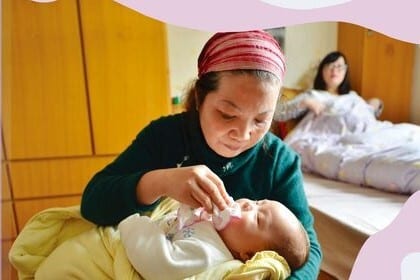Understanding Postpartum Support
Postpartum support is crucial for new mothers as they transition into motherhood. Two common types of postpartum support are provided by doulas and confinement ladies. Each plays a unique role in aiding new mothers during the postpartum period.
The Role of a Doula
A doula is a trained professional who offers continuous emotional, physical, and informational support to a mother before, during, and shortly after childbirth. The primary focus of a doula is to ensure the mother feels supported and empowered throughout her birthing experience and the early postpartum period.
Key Responsibilities of a Doula:
- Emotional Support: Offering reassurance, encouragement, and a calming presence.
- Physical Support: Assisting with comfort measures such as massage, positioning, and breathing techniques.
- Informational Support: Providing evidence-based information to help mothers make informed decisions.
- Advocacy: Helping mothers communicate their needs and preferences to healthcare providers.
- Breastfeeding Support: Assisting with the initiation and continuation of breastfeeding.
For more detailed information on the benefits of hiring a doula, visit our page on postpartum doula.
The Role of a Confinement Lady

A confinement lady, also known as a “yue sao” in Chinese culture, is a traditional postpartum caregiver who assists new mothers during the confinement period. This period, typically lasting 30 to 40 days, is focused on the mother’s recovery and the newborn’s care, following ancient customs and practices.
Key Responsibilities of a Confinement Lady:
- Traditional Practices and Knowledge: Implementing traditional postpartum practices to aid recovery and promote health.
- Newborn Care: Handling tasks such as bathing, feeding, and soothing the baby.
- Postpartum Recovery Support: Preparing special confinement meals, assisting with postnatal exercises, and ensuring the mother’s rest and recovery.
Example of Traditional Practices:
- Dietary Restrictions: Preparing nutrient-rich foods that align with postpartum tradition.
- Herbal Baths: Using herbal mixtures for the mother’s baths to aid in healing and relaxation.
For further insights into the role of a confinement lady and the associated cultural practices, visit our article on confinement nanny.
Understanding the distinct roles of a doula and a confinement lady can help new mothers decide which type of support best suits their needs during the postpartum period. Both professionals offer valuable services that contribute to a smoother transition into motherhood and ensure the well-being of both the mother and the newborn.
Doula vs. Confinement Lady
When considering postpartum support, it’s essential to understand the differences between a doula and a confinement lady. Both play vital roles but differ significantly in training, scope of services, and cultural context.
Training and Certification
The training and certification processes for doulas and confinement ladies vary widely.
| Role | Training | Certification |
|---|---|---|
| Doula | Formal training programs, workshops | Certification from organizations like DONA International |
| Confinement Lady | Apprenticeship, informal training | No formal certification relies on experience and traditional knowledge |
Doulas typically undergo structured training programs that cover a wide range of topics, including childbirth, breastfeeding, and emotional support. They often receive certification from recognized organizations, ensuring a standardized level of service.
In contrast, confinement ladies, also known as yue sao, usually gain their skills through apprenticeships and hands-on experience. They rely heavily on traditional practices passed down through generations, and there is no formal certification process.
Scope of Services Provided

The scope of services offered by doulas and confinement ladies can differ significantly, reflecting their distinct roles.
| Service | Doula | Confinement Lady |
|---|---|---|
| Emotional Support | Yes | Yes |
| Physical Support During Labor | Yes | No |
| Breastfeeding Assistance | Yes | Yes |
| Traditional Postpartum Care | No | Yes |
| Newborn Care | Limited | Extensive |
| Household Management | Limited | Yes |
Doulas are primarily focused on providing emotional and physical support during labor, as well as postpartum care and breastfeeding guidance. They are trained to assist with the emotional and psychological aspects of childbirth and the postpartum period.
Confinement ladies, on the other hand, offer comprehensive support that includes traditional postpartum care, newborn care, and household management. Their services are deeply rooted in cultural practices such as specific dietary guidelines and postnatal rituals.
At My Asian Nanny, we specialize in referring only the best and most qualified Postpartum confinement ladies. If this service sounds interesting to you, please feel free to contact us today to learn more.
Cultural and Traditional Differences
Cultural and traditional differences play a significant role in distinguishing between doulas and confinement ladies.
| Aspect | Doula | Confinement Lady |
|---|---|---|
| Cultural Context | Varied, modern | Traditional, Chinese |
| Postpartum Practices | General | Specific rituals such as “sitting the month” |
| Dietary Guidelines | General advice | Specialized confinement diet |
Doulas operate in a variety of cultural contexts and offer support that is typically more flexible and modern. They may not adhere to specific cultural or traditional practices but rather focus on the overall well-being of the mother and baby.
Confinement ladies, particularly in the Chinese tradition, follow specific postpartum practices known as “sitting the month” or the postpartum confinement period. This includes adhering to postpartum confinement rules, such as dietary restrictions and traditional rituals aimed at ensuring the mother’s recovery and the baby’s health.
Understanding these differences can help expecting mothers make an informed choice between hiring a postpartum nanny or a confinement nanny. Each offers unique benefits tailored to different needs and cultural backgrounds.
Benefits of Hiring a Doula
Hiring a postpartum doula offers numerous benefits for new mothers. From emotional support to breastfeeding assistance, a doula can make the postpartum period more manageable and less stressful.
Emotional Support
A postpartum doula provides invaluable emotional support to new mothers. Adjusting to life with a newborn can be overwhelming, and having someone experienced to offer reassurance and guidance can make a significant difference. Doulas are trained to listen and provide non-judgmental support, helping mothers navigate the emotional highs and lows that come with postpartum recovery.
Breastfeeding Support
Breastfeeding can be challenging, especially for first-time mothers. A postpartum doula offers expert breastfeeding support, helping mothers with latching techniques, positioning, and troubleshooting common breastfeeding issues. This support can be crucial in establishing a successful breastfeeding relationship. For more on breastfeeding support, visit our article on postpartum care.
Postpartum Care and Education
A doula also provides comprehensive postpartum care and education. This includes practical advice on newborn care, such as bathing, diapering, and soothing techniques. Additionally, doulas educate mothers on postpartum recovery, offering tips on self-care, nutrition, and recognizing signs of postpartum depression.
| Benefit | Description |
|---|---|
| Emotional Support | Provides reassurance and guidance during the postpartum period. |
| Breastfeeding Support | Assists with latching, positioning, and common breastfeeding problems. |
| Postpartum Care and Education | Offers practical advice on newborn care and recovery tips for mothers. |
Understanding the benefits of hiring a postpartum doula can help mothers make informed decisions about their postpartum support needs. For more information on how a doula can assist during the postpartum period, check out our articles on postpartum tradition and postpartum tasks.
Benefits of Hiring a Confinement Lady
Hiring a confinement lady, also known as a yue sao, can provide numerous benefits for new mothers during the postpartum period. These benefits stem from their extensive knowledge of traditional practices, expertise in newborn care, and support for postpartum recovery.
Traditional Practices and Knowledge
A confinement lady brings a wealth of traditional knowledge and practices that have been passed down through generations. These practices are designed to aid in the mother’s recovery and ensure the well-being of both the mother and the newborn.
Key traditional practices often include:
- Specialized Diet Plans: Offering nutrient-rich meals to help the mother regain strength.
- Herbal Baths: Using specific herbs to promote healing and relaxation.
- Postpartum Confinement: Advising on the postpartum confinement period to ensure proper rest and recovery.
For those interested in the cultural aspects and traditional knowledge, a confinement lady can provide invaluable guidance. More on these practices can be found in our article on postpartum tradition.
Newborn Care
One of the primary roles of a confinement lady is to assist with the care of the newborn. This includes:
- Feeding: Helping with breastfeeding or bottle-feeding.
- Bathing: Proper techniques for bathing the baby.
- Sleep Routines: Establishing healthy sleep patterns for the infant.
Their expertise ensures that the newborn receives optimal care, allowing the mother to focus on her recovery. For a deeper dive into the costs associated with hiring such services, visit our guide on chinese postpartum nanny costs.
Postpartum Recovery Support
A confinement lady also provides essential support for the mother’s postpartum recovery. This support can include:
- Physical Recovery: Assisting with exercises and activities that promote healing.
- Emotional Support: Offering companionship and emotional reassurance during the postpartum period.
- Education: Teaching new mothers about postpartum care and best practices for recovery.
Their comprehensive support helps to ensure that the mother recovers well both physically and emotionally during this critical period. For further details on hiring a confinement lady, visit our article on hire a confinement nanny.
By understanding the benefits of hiring a confinement lady, new mothers can make informed decisions about their postpartum support options. Whether it’s through traditional practices, expert newborn care, or comprehensive postpartum recovery support, a confinement lady can be an invaluable asset during this transformative time. For more information on the differences between a confinement lady and other postpartum support roles, such as a postpartum doula, explore our related articles.

